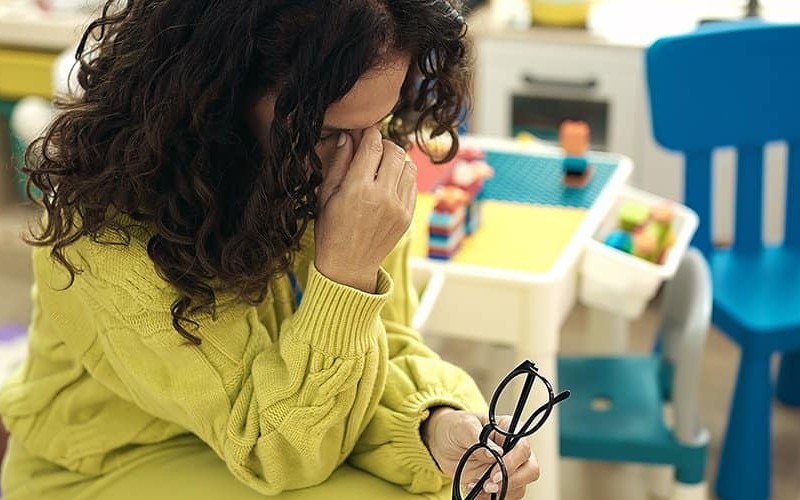America Expects Saints, Not Teachers
It’s a given that most teachers are some of the most selfless people who walk the face of the earth, but let’s acknowledge that they are also are some of the most underappreciated and underpaid professionals in America.

As a kid, one of my favorite films involved Mexicans who counted. That movie, Stand and Deliver, was inspired by the real-life story of Jaime Escalante, a Bolivian immigrant who became a celebrated calculus teacher in East Los Angeles. The film rightly brought out the fangirl in me.
Many of Escalante’s students were stubborn Chicanos and I related; I was a Chicana and I hated algebra; history was my jam. The movie also featured Latine nerds, an archetype that was familiar but that I hadn’t seen on the big screen. Lastly, Escalante reminded me of my mom, Beatriz, a Mexican immigrant who taught public school in California.
As an adult, I now recognize the movie’s pernicious flaws.
Stereotypes are central to the plot of Stand and Deliver and while its ethnic caricatures are hard to miss – the cholo who feels pressured to hide his book smarts versus the cholo who refuses to learn – I didn’t understand how one of the movie’s primary stereotypes distorted my understanding of the teaching profession until I set foot in a classroom to instruct. Films like Stand and Deliver hurt educators by representing us as engaged in a morbidly transactional profession. In exchange for sacrificing our mental and physical health, we achieve hero status.
Martyrdom underwrites our goodness.
As the coronavirus continues to take lives, the lives of teachers and school staff included, the good-educator-as-unflinching-martyr trope is being used to shame those of us who express concerns about IRL instruction. Last month, New York Times’ columnist David Brooks penned a screed that all but accused educators critical of their working conditions of laziness, stupidity, and cowardice.
Brooks seems to prefer stoic teachers ready to become ill and die and I imagine the columnist watching Stand and Deliver, nodding in approval at a scene set during a night school session. Escalante, who has taken on a second job as an English instructor, shuffles about a classroom, clutching at his chest while he leads adult students through a set of language drills. The students seem unaware of their teacher’s distress and Escalante excuses himself. Once he’s out of their sight, he loses his composure. He sweats and pants, wheezing as he struggles to make his way down a desolate flight of stairs. Crumpling to the floor, Escalante presses his face against the seemingly cold cement as he experiences a heart attack.
(I imagine Brooks leaping to his feet to give a standing ovation! “That’s the spirit!” he screams.)
Several scenes later, Escalante convalesce in a hospital bed. His teenage son tells him, “Dad, the doctor says no stress. No job-related activity for at least a month.”
Escalante quips, “I want another doctor.”
The teacher urges his family to go home, and after they leave, he produces a pamphlet and a pen. He scribbles calculus notes and gives them to a nurse who smuggles the mathematical contraband to his students.
This plot point begs a question: If a heart attack is an unacceptable reason for a teacher to rest, what constitutes a justifiable reason?
Decapitation?
Not if the instructor who’s lost her head teaches home economics: Let her thread a needle!
Too many Americans hold teachers to the grotesque standards set by films that portray us as modern saints. I once evaluated myself according to such moral benchmarks and the first week that I taught ninth grade, I held myself to them. I developed a sore throat that I hoped could be cured by ignoring it. The pain overwhelmed me and speaking became torture. A student stared at me as I struggled to remain upright.
“Ms. Gurba,” she said, “you don’t look…good.”
“I’m fine,” I coughed. I taught the rest of the day while seated.
After school, I went to a clinic where I discovered I had strep throat and while I understood that I was infectious, I also understood that if I used sick days to recuperate, it was likely that parents, fellow faculty, administrators and even students might think me selfish. It’s not only the perfect attendance of students that’s celebrated. Teachers who come to work in spite of illness are often celebrated as well. They’re lauded for their selflessness. That’s what people have been conditioned to expect of teachers. No selfhood. Just selfless vibes.
I permitted myself one day off and agonized about it the entire time that I watched Jerry Springer.
In November of last year, CNN reported on a teacher who conducted elementary school lessons from her hospital bed following surgery. I found CNN’s fetishization of her convalescence cringeworthy but the news outlet, desperate to canonize her, placed her story in a section of its website titled “the Good Stuff.” The Good Stuff offers “headlines that make you smile” and its report on Stephany Hume characterized her as “inspiring,” “the type of teacher we all wished we’d had in elementary school.” Apparently, an ideal teacher is one whose identity is defined by unrelenting sacrifice: “…when the English language arts teacher of 20 years went to the hospital for an unexpected hernia surgery, she still made sure to read to her students at Sewell Elementary from her hospital bed — gown and all.”
Teachers are never not supposed to be giving.
We are supposed to give ourselves away until nothing remains.
Celebrating cases like Hume’s sets an absurd standard for teacher behavior, one that requires saintliness. This standard exists because, like nursing, teaching is a feminized profession with moral expectations dictated by fucked up gender norms. Since the beginning of the twentieth century, the education of children has been treated as an “inherently ‘feminine’ pursuit” and data shows that the profession has grown increasingly gender segregated. 77 percent of public school teachers in the United States are women, with the “the average teacher [being] a 43-year-old white woman.”
The logic of misogyny drives the urgency with which assholes like Brooks call for teachers to return to IRL instruction. Because teachers are feminized, we’re expected to be unconcerned with our own well-being and wholly consumed with the well-being of strangers’ kids. This conceptualization falls within a framework theorized by philosopher Kate Manne, one that she terms the “human being/giver distinction.” According to this distinction, women function as givers and must conform to a set of obligations that are fundamentally economic. We must offer love, attention, affection and admiration as well as caregiving labor without the expectation of any of these moral goods or services in return. Here I will stress that the allocation of these moral goods and services is synonymous with the teaching profession.
I enjoy teaching but it’s not a religious vocation.
It’s a job, one that has become increasingly difficult to perform during the pandemic, with 77 percent of teachers reporting an increased work load compared with last year. Thanking us for our labor isn’t just unnecessary: it’s condescending. We work because we must, because under racial capitalism, we have been disciplined to the wage and racial capitalism that will punish us if we dare to critique the prevailing set of economic relations. The highest expression of gratitude to educators isn’t a litany of platitudes. Most of us would prefer to work in safe environments where our health is prioritized. In order to give that to teachers, Americans will have to relinquish their fetishization of us as selfless givers.




